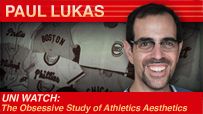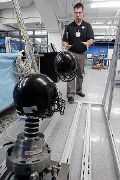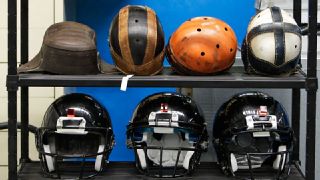|
Yesterday we tried to sort out the particulars of the NFL's new ban on alternate helmets, which has forced the Buccaneers to cancel their throwback game and may put the kibosh on other teams' throwback plans as well.  Today we have an intriguing follow-up: an interview with an NFL equipment staffer, who agreed to discuss the league's new helmet rule on the condition that neither he nor his team be identified. Let's call him Equipment Guy. Equipment Guy has been on the job with his team for 10 years, and he works directly with his team's helmets. Here's how our interview went. Uni Watch: When did you become aware of this new helmet rule? Equipment Guy: Three or four weeks ago, around the time they sent out that memo about it. It was kind of a shock -- like, "What? Where is this coming from?" All the NFL equipment managers have meetings in March, and this wasn't on the radar at all. Our team doesn't have a throwback, so it doesn't really affect us, but it was still a shock. UW: The underlying theory is apparently that it's safer to stick with one helmet for the whole season. EG: I think that's the big message that the NFL's trying to give. But I think, personally, one of the bigger issues is that there are currently guys in the NFL -- on our team, on every team -- who wear helmets that aren't made anymore, like the Riddell VSR4. Riddell doesn't make that helmet anymore. So whatever we have in stock is what we give to players who like that helmet. And after this year, we're going to run out, so players will eventually have to switch to something else. UW: But what does that have to do with the new rule? EG: Let's say you're a team with a throwback helmet, and you're not going to be able to get a certain player his preferred helmet model because it's not made anymore. So now he's not just wearing a different helmet -- he's wearing a different type of helmet. I think the NFL, with all those lawsuits they're dealing with, they don't want to have a guy switching to a different helmet for one game, then he gets hurt, and then he says, "Well, I had to switch to a different helmet because they made us wear these throwbacks." UW: That's really interesting. So you're saying the NFL is concerned about players who wouldn't be able to get a true duplicate of their current helmet because they're wearing obsolete equipment. EG: I think that's their bigger concern, yes. They don't want a situation where a player has to change to a different model, and then something goes wrong, and that's on their plate. Now, again, that problem will soon go away, at least for our team, because we'll run out of stock on those helmets that aren't made anymore. But other teams may have more stock on those.  UW: I was talking to an NFL spokesman, and he didn't say anything about that. He said that when you switch out a helmet, it takes time to break in the new one, and that can cause safety issues if it isn't broken in well enough. Is that true? EG: It was true 10 years ago, maybe even five years ago. But helmet technology now is much better. There's really no break-in process for about 90 percent of the helmets, at least in my opinion. UW: I realize some players may have issues with damaged helmets or radio-equipped helmets. But for the typical player, the average player, do they stick with one helmet for the entire season, or do they swap them out for whatever reason? EG: That could vary from team to team. For us, I do the weekly helmet check, where I look for any cracks, gouges, and any other defects that can result from head-to-head contact. If there's a big gouge in the paint that I can't cover up with some of the techniques I have, like with a paint pen, then I'll take all the parts out of the inside of the helmet and put those parts into a newly painted shell. So that would be how a player gets a new helmet. But always with those same parts, so it fits the same. UW: So only if the helmet is dinged up. EG: Yes. For some players, who have a lot of head-to-head contact, I have to do that three or four times a year. Some other guys -- receivers or defensive backs -- they'll be in that same helmet for the whole season. UW: And are you making that determination more on an aesthetic basis, or because the helmet has become unsafe? EG: I'd say 80 percent of the time it's based on how it would look on TV. And then there are those cases where the helmet is actually damaged, after one of those big "Ooooh!" and "Ahhh!" hits. Sometimes the shell will actually get dented. UW: Is this new rule going to change your approach to switching out helmets for aesthetic reasons? EG: No. My boss brought it up to the league -- "What do you mean we can't change helmets? We change helmets on a regular basis." And they said, "No, no, that's not what the rule is for. We just don't want them changing to a completely different helmet that they haven't worn all year" and all that. UW: Many fans and readers have asked me, "Why can't they just paint their helmets to the throwback color and then paint them back to the regular color the week after that?" EG: That might have worked in the past, with some of the old paints they used to use. When I first started here, we would go around on Sunday after a game, pick out the helmets that needed a new paint job, and then on Monday morning we'd send 'em to a local reconditioner who'd paint 'em and get 'em back to us by Tuesday afternoon, and they'd be ready to go. But the paint on today's helmets -- at least for our team -- takes four to five days to cure. The hardening agent in the paint takes longer to set up. And you need the helmets back by Wednesday, to practice in. UW: Hey, speaking of practice, that brings up another point: Do players all practice in their game helmets, or do they have separate helmets for practice? EG: For us, they use their game helmets. I can't speak for every team in the league. UW: Some fans have been saying, "This rule is silly. Wouldn't a new helmet be safer than a helmet that's been beaten up over the course of eight or nine games?" That seems logical from a layman's standpoint, but is it true? EG: I would say that the structural integrity of the helmet isn't really affected on a game-to-game basis, except on those gigantic "Ooooh!" and "Ahhh!" hits. UW: Will a player use the same helmet again the following season, if he's still with the team? EG: Yes -- if the player doesn't buy it. We give them the option to buy the helmet at the end of the year. If they don't, it goes back to the reconditioner. They sand-blast it, repaint it, clean it out, and then at that point the reconditioner does a very thorough test to make sure it's safe and meets all the standards. Occasionally a helmet will be rejected at that point, but that's rare. UW: Are the players even aware of this new helmet rule? EG: I'm not sure they are. Again, it wouldn't really affect our team because we don't have throwbacks. UW: Have you talked about the new rule with equipment staffers on other teams? EG: I haven't. I know my boss has been talking with some of the other guys, but I don't really talk to other teams' equipment guys except on game day, and this hasn't come up yet in conversation. UW: Oh. I sort of pictured you all participating in some big message board community or something. EG: There is something like that, actually, but it rarely gets used, mainly because most of us are so insanely busy. --------- All very interesting. If any other NFL equipment staffers would like to discuss the new helmet rule (or anything else uni- or equipment-related), you know what to do. Paul Lukas has definitely said "Ooooh!" and "Ahhh!" after seeing a big hit. If you liked this column, you'll probably like his daily Uni Watch web site, plus you can follow him on Twitter and Facebook. Want to learn about his Uni Watch Membership Program, be added to his mailing list so you'll always know when a new column has been posted, or just ask him a question? Contact him here.
|


